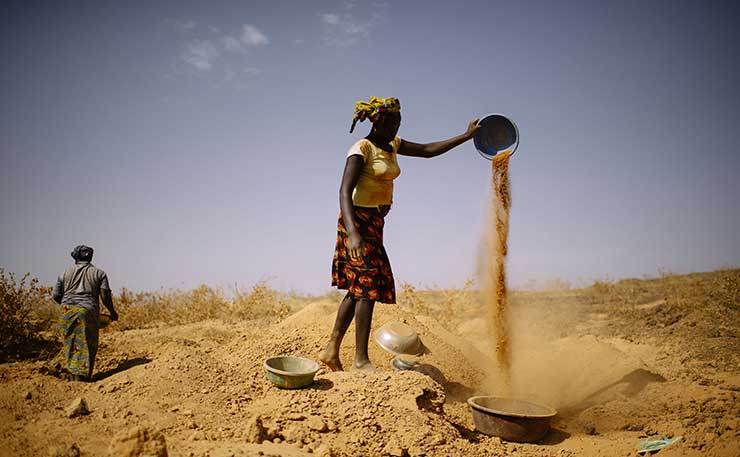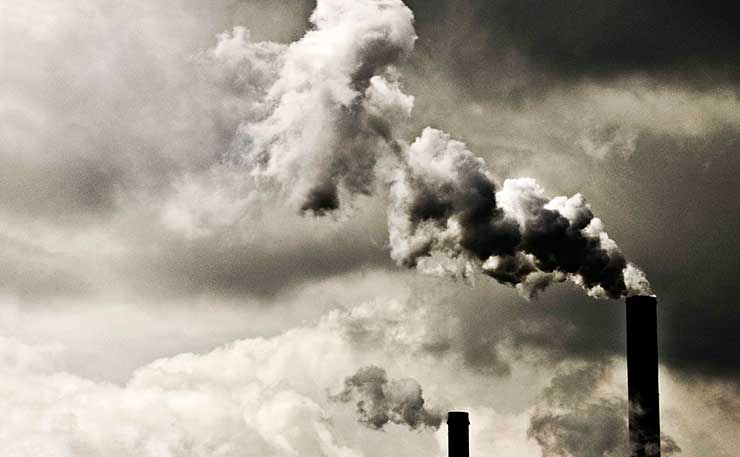DON’T MISS ANYTHING! ONE CLICK TO GET NEW MATILDA DELIVERED DIRECT TO YOUR INBOX, FREE!
Australians and Australian companies aren’t just wrecking Australia. We’re doing more than our share to stuff up the rest of the world, writes Richard Hil
These are Australia’s biggest exports in rank order, one to ten:
1. iron ore
2. Coal
3. Education
4. natural gas
5. personal travel services
6. gold
7. aluminium ore
8. beef
9. wheat
10. crude petroleum.
You’ll notice that over half of these involve resource extraction, something that’s in our nation’s economic DNA. We dig the stuff out of the ground, process it, and flog it off around the world to the highest bidder.
When it comes to coal, we’re world leaders and have been for some time. These days, that’s nothing to be proud of. Most of us now see this as a form of climate violence. For coal producers and governments, it’s a revenue raiser that ends up mostly in the pockets of overseas investors.
Propped up by governments, “development” agencies and banks, mining companies prowl the globe in search of suitable profit-making sites. Like other companies around the world, Australian mining conglomerates have benefited hugely from neoliberal deregulation policies, generous government subsidies and lack of proper oversight when it comes to foreign investments.
These have helped stoke the rapacious impulses of some of the world’s leading fossil fuel companies – an impulse clearly at odds with growing public concern over the climate emergency. In effect, Australia is a giant quarry for foreign money makers who are happy, as we shall see, to dig up coal wherever it’s available, and lots of it, here and in foreign lands – particularly the poorer countries.
As independent journalist Martin Lukacs recently observed in The Guardian, while we’re all being exhorted to reduce our carbon footprints, carbon-emitting fossil fuel companies are helping to fast-track us toward oblivion. Divestment campaigns may have slowed investments in some parts of the resource sector, but coal, gas and oil nonetheless remain an integral part of Australia’s “energy mix”.
Globally, the fossil fuel industry remains buoyant too, with the International Energy Agency putting global energy investment at around $US1.8 trillion in 2017.

While investments in renewable energy projects are rising exponentially, it seems that the suicidal addiction to fossil fuels is hard to break, even when corporate heavyweights in other sectors like Google, Facebook and IKEA – hardly moral crusaders – have turned toward alternative energy sources.
How do we explain this self-defeating situation? Whatever it takes to meet consumer demand? Yes. Bloody-mindedness? Perhaps. Simple greed? Likely. Business, after all, is business, even if the planet is cooking.
Industry, emissions, profits
Drawing on a 2018 report by the Climate Accountability Institute, environmental journalist, Tess Riley, notes that: “Just 100 [fossil fuel]companies have been the source of more than 70% of the world’s greenhouse gas emissions since 1988”, and “more than half of global industrial emissions since 1988 – the year the Intergovernmental Panel on Climate Change was established – can be traced to just 25 corporate and state-owned entities.”
State-owned and private enterprises such as China Coal, Saudi Arabian Oil Company (Aramco), Gazprom OAO, National Iranian Oil Co and Exxon Mobil make up the top five emitters, while Australia’s BHP Billiton and Rio Tinto are in the top fifty.
Fat cat corporations know when and where there’s a profit to be made. Australia’s an easy touch, with 86% of the nation’s mining industry (including Rio Tinto and BHP Billiton) owned by foreign entities, mainly from the US and Britain. Tens of millions of dollars are invested to ensure that this happens.
According to a report by the Australian Institute in 2017, over the past decade around $541 million has been spent by overseas companies on lobbying successive Australian governments in order to secure lucrative mining leases. The amount spent by each company, however, is kept secret, which isn’t all that surprising given that the main policy settings and public relations agendas are formulated by the likes of the Minerals Council of Australia and the Queensland Resources Council, whose majority board members represent overseas interests.
For “Australian” mining companies, fossil fuel extraction is a lucrative business, made more so by the expansion of their overseas projects. According to a 2017 report by the International Mining for Development Centre (IMDC), Australian trade and investment in mining are on the rise in Indonesia, China, India and South America, with most focused on the extraction of coal, uranium, iron ore, industrials and speciality metals.
The biggest investments, however, are on the African continent, a trend attributed, says the IMDC, to “the vital importance of ongoing economic diplomacy and capacity building support from Australia to key countries… in support of Australia’s long-term mining interests.” The revenue forecasts, or what the industry refers to as the “massive latent value” from these investments, are estimated at around $2 trillion, a figure rightly described by the IMDC as “spectacular”, mainly due to “a better understanding of the mining sector footprint, and Australia’s economic diplomacy efforts”.

As if to highlight the philanthropic credentials of Australian mining companies, the IMDC argues that investments in mining will serve the “interests both of Australian companies and the nations that host them and the minerals and energy deposits these companies have discovered”.
Such heart-warming sentiments, however, do not seem to be shared by the people of Africa.
Bearing the cost of profit-making
A report released in August last year by women’s rights organisation, ActionAid Australia, offers some insight into the impact of mining on many of Africa’s most impoverished people. The report, Undermining Women’s Rights: Australia’s global fossil fuel footprint, found that there were 59 Australian Securities Exchange (ASX) listed companies operating on the continent. All told, they had invested in 150 fossil fuel projects, mostly in poorer regions.
Once fully operational, these mines and oil fields will eventually contribute to millions of tonnes of greenhouse gases being pumped into the atmosphere, adding significantly to Australia’s global warming quota. As noted by online information agency, Africa Renewal, these emissions will further impact a continent already devastated by extreme weather events, thereby accelerating the “multiplier threat”, meaning an intensification of existing social, economic and political problems.
More droughts, extreme heat, desertification and super storms will occur, with women and children most at risk.
ActionAid spokesperson, Lucy Manne, remarks that: “Fossil fuel extraction [in Africa]is a feminist issue. In communities affected by fossil fuel projects in low income countries, women experience an increase in gender-based violence, HIV rates, chronic health problems, food and insecurity, and unpaid labour. And these projects also contribute to the catastrophic impacts of climate change, which is leading to more ferocious and frequent disasters year on year, which we know disproportionately affect women living in poverty and exclusion”.
Manne sheets home this situation to the hands-off approach of successive governments which have failed “to sufficiently regulate Australian coal, oil and gas companies operating in low income countries”, effectively “shirking its commitments under international human rights treaties and the Paris Climate Agreement.”
For many impoverished communities, the arrival of mining operations often prove devastating. According to Yvonne Samper, member of the Greater Pholad Ogives Women’s Forum in the province of Mpumalanga in South Africa, Australian mining companies, “have a huge impact on our lives as women who are living in mining affected communities. The mining companies are exploiting us. They are also making us sick by polluting our water. Our air is also polluted, water is contaminated, the soil is also contaminated. It’s a women’s issue because we make the fire to sustain our family and livelihood.”
The absence of rigorous transparency and accountability in overseas projects is of great concern to African people whose lives are so closely tied to the land upon which they depend. Africa is of course only one port of call for eagle-eyed investors. Current and planned projects in South America, Europe and Asia testify to the extensive reach of Australian companies.
More Australian mining investment opportunities are also anticipated in India as result of recent changes to the nation’s overseas investment rules in February 2018. Private firms will be encouraged to establish fossil fuel projects, with restrictions on the use and sale of coal set aside. Indian mining companies will be seeking expertise, skills and various forms of mining-related technologies from overseas and Australian companies will increase exports of iron ore for steel manufacture (a carbon intensive process) as well as metallurgical coals.
Indonesia has also attracted strong interest from the Australian mining sector, with coal, nickel, copper and gold extraction likely to expand. The impact of these developments on villagers has already proved significant.
Jeff Aitchison of Oxfam Australia notes that countless villagers have been forced off their life-sustaining lands and precious water supplies have been poisoned. Protests against such destruction have, more often than not, been met with brute force.
Banking on more profits
These trade and investment “opportunities” have received a boost from Australian banks that, once again, have demonstrated a preparedness to fund carbon emitting mining projects. If there’s money to be made, banks are keen to get in on the act.
Investment tracking organisation, Market Forces, reported in May 2018 that Australian banks “collectively loaned $21 billion to fossil fuels since supporting [the Paris agreement]. This included lending to many new fossil fuel projects – the type of projects most incompatible with constraining dangerous global warming… Last year saw the big four lend to dozens of climate-wrecking projects and companies despite their climate commitments.”

The biggest lender to the fossil fuel industry in Australia is the ANZ Bank which, according to Market Forces, has loaned $7.4 billion to the mining sector since 2015: “more than seven times its lending to renewable energy.”
There’s nothing particularly new about this. Indeed, Australian banks have long supported the development of critical infrastructure required for mining and exploration projects in Australia, inducing coal ports and LNG terminals in and around the Great Barrier Reef. They’ve also bank-rolled many overseas projects. Foreign banks are in on the act too, with US, Chinese and Indian institutions generously supporting fossil fuel projects in Australia and around the world.
Whichever way you look at it, Australian companies, the banking system and successive governments continue to play a major role in ensuring our nation’s contribution to planetary destruction. This is being done outside the purview of the Australian public, with insufficient media attention, and in the face of the public’s desire for immediate action on the climate emergency.
The women and children of Africa, and the villagers in Indonesia and elsewhere, of course, have little or no say in this cruel deceit. They merely suffer the consequences.
As I write the unpeople of Mozambique are confronting the full horrific consequences of tropical cyclone Kenneth – the most ferocious storm to hit this part of Africa. The results so far? Nearly 4,000 homes destroyed, 30,000 people evacuated, crops devastated – lives turned upside down, following on from the devastation of cyclone Idai five weeks before. All this in one of the poorest countries on Earth, a situation about to deteriorate given the IMF’s $118 million loan which will plunge Mozambique further into debt.
Director of Jubilee Debt Campaign, Sarah-Jayne Clifton, described this increased debt burden as, “a shocking indictment of the international community”, whose richer nations are responsible for rising levels of greenhouse gas emissions. Business, it seems, is business, so long as long as others pay the price.
But this may be about to change. The international campaign for “climate damages tax” on fossil fuel producers is gaining traction. Whether this campaign succeeds or not, it at least draws attention to the perpetrators of climate violence – the governments and corporations of rich, industrialised nations.
As the world’s leading per capita carbon emitter and leading coal exporter, Australia is among the front runners.
Shameful. Violent.
Donate To New Matilda
New Matilda is a small, independent media outlet. We survive through reader contributions, and never losing a lawsuit. If you got something from this article, giving something back helps us to continue speaking truth to power. Every little bit counts.




